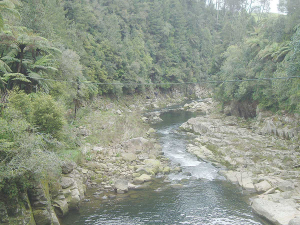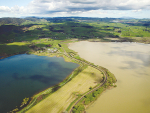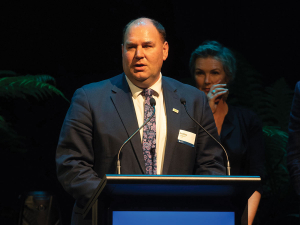Dry weather conditions are putting Bay of Plenty Regional Council waterways under unusual pressure.
The council says it is putting extra preparations in place to ensure the region’s waterways are well cared for if this summer’s dry weather continues.
The council’s regulatory services general manager Sarah Omundsen says rules and consent conditions are in place to protect the base flows that keep local waterways healthy. But soil moisture levels are getting very low and some of the region’s rivers and streams, especially in the western Bay of Plenty, have come close to record low flows in recent weeks.
“We haven’t reached the threshold for extra water restrictions yet, but we’re getting close and making preparations to act if it’s needed.
“We’ve had small amounts of rain recently but need significantly more to really make a difference,” she says.
At an extraordinary Regional Council meeting this month, Omundsen told councillors that staff have increased their water and compliance monitoring efforts in response to the prolonged dry spell.
Staff have also been meeting weekly with the Bay of Plenty Primary Sector Co-ordination Group, which includes agencies such as Ministry for Primary Industries (MPI), Rural Support Trust, Fonterra, and NZ Kiwifruit Growers, to ensure a coordinated response to the effects of the current prolonged period of low rainfall for the region.
MPI and industry groups are offering support to farmers and growers through their networks and the Rural Support Trust 0800 number (0800 787 524).
“We’ve also been in close contact with our local district and city councils to monitor how their municipal supply systems are holding up,” Omundsen said.
All of the municipal water suppliers have been encouraging people to conserve water as much as possible. Only Tauranga City and Western Bay of Plenty District Councils have needed to put formal restrictions in place so far; in the form of a sprinkler ban for Tauranga, and a sprinkler and hose ban for Te Puke.
As part of preparations, councillors approved a process for issuing Water Shortage Directions (WSD) under the Resource Management Act (s.329), at their extraordinary meeting today.
“We’ve never had to use a Water Shortage Direction before and we hope we won’t have to yet. This decision means staff can be responsive, flexible and act quickly as needed based on changing weather conditions and the particular water demands, environmental and cultural values in each waterway and catchment,” Omundsen.
If water flows in a particular river or stream get too low, Regional Council can use a WSD to temporarily manage that. Direction details will be determined on a case-by-case basis, but could include actions such as staggering the timing of water takes or reducing the amount or the purposes for which people may take water from a river, stream or aquifer.
“If we do have to put a Water Shortage Direction in place, we’ll inform consent holders and water users in the affected catchments about the direction details at that time.
“It would be a temporary measure until we get enough rain to restore and sustain minimum base flows.
“In the meantime, everyone can help avoid the need for new restrictions by checking for leaks, reducing water use wherever they can, and making sure they’re not taking water illegally.
People should call us on our 0800 884 883 Pollution Hotline if they’re concerned about low flows or potentially illegal water takes.
Information about water take consents and permitted activated levels is available at www.boprc.govt.nz/wateruse. Live monitoring data, including stream/river water levels, rainfall, ground water level and soil moisture information from Regional Council’s network of more than 100 hydrological monitoring sites is available at www.boprc.govt.nz/livemonitoring.











